Duncan Turner
More posts from Duncan Turner
After rising for a decade, life expectancy in America has begun leveling off and has even declined for some groups.
Diabetes, heart disease and obesity along with stress, anxiety, and depression are now major issues. The situation is almost as if the technologies that have improved life in so many ways are now slowly killing us. Meanwhile, maverick quantified
Meanwhile, maverick believers in the quantified-self manage to diagnose themselves successfully.
The future, fortunately, looks more promising. According to the CEO of Johnson & Johnson, the world’s leading healthcare company, ‘we have the opportunity to make the generation born now the healthiest generation in history – “Gen H”.
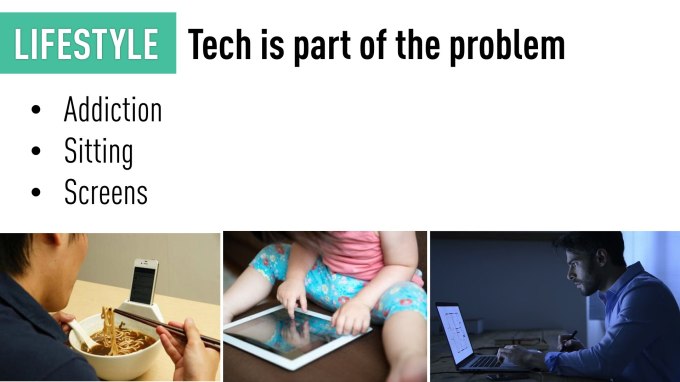
From Sick Care to Scientific Wellness
Today, the health care system is largely designed around illness. The system pays for disease, and not, for instance, for healthy, nourishing food. This at a very high cost for society and individuals (most personal bankruptcies are health-related). It’s literally a trillion-dollar question. Adding to this a global lack of healthcare professionals, the situation is ripe for disruption.
Now, there are many determinants to health. Though your mileage may vary it was mentioned several times that lifetime health is linked for 60% to our behavior and environment, 30% to genetics and 10% to healthcare.
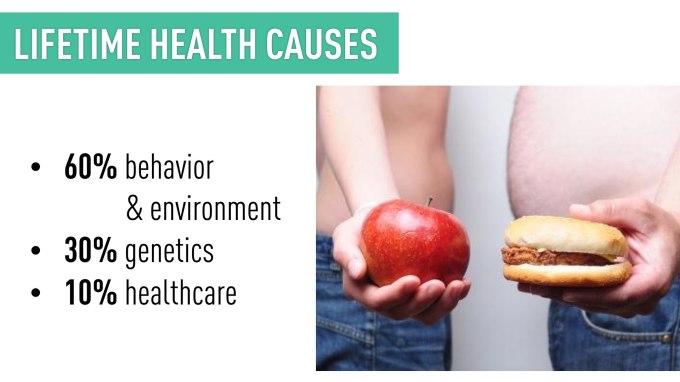
Today’s crazes about chia seeds, poke bowls, Bulletproof Coffee and other ‘superfoods’ underlines our hopes to figure out wellness – not unlike Kellogg’s fictionalized attempts in the Road to Wellville. This inspired in turn Esther Dyson to look into city-level experiments.
But change is coming: last month, a group of forward-thinking innovators gathered at the first ‘Wellness-as-a-Service’ event named HyperWellBeing at the iconic Computer History Museum in Mountain View.
Key ideas emerged rapidly: the future of healthcare could shift from sick care to a new industry of ‘Scientific Wellness’, helping us live to our full potential for wellbeing. Also used was the expression ‘P4 Medicine’: Predictive, Personalized, Preventive and Participatory. The targets are to prevent our sicknesses, increase our longevity and optimize our health and wellness.

Health Tech Devices To The Rescue
When talking about health tech, we often hear of big data, telemedicine and genomics (with CRISPR). While this is important, it doesn’t give a full picture: software only works when data comes in. For health, this requires learning from our bodies and minds. This is where health devices come in.
This trend started about two years ago, as key sensors were becoming commoditized – partly thanks to smartphones – and the costs and risks of building high-tech hardware startups were falling. Biomedical engineers, doctors and entrepreneurs started to jump into the fray.
Today, startups want to track, prevent, diagnose and heal both physical and mental conditions. They want us to be more than well, and this is serious business.
Emerging Categories
The most famous wellness device might be the Fitbit, but many users abandon it within weeks. Just like taking meds, this shows that a key challenge to good health is behavior. As we have seen at HAX through over two dozen investments, there is much more to health devices that step counters, which became a commodity since Xiaomi released its Mi Band for a mere $15.
Now please bear with us as we coin a few words for some emerging categories.
Sports Coach-ware: Combining sensors, A.I., data for injury prevention or coaching. Just looking at running, Vi is an A.I.-powered coach, while the Tiemppo smart in-soles help improve your running form with real-time gait analysis. These approaches are expanding to various sports.
Wellness Tech: There are now trackers to help cope with the ills of modern life. AirVisual tracks pollution, AIR Sensio detects allergens, many others like Hello’s Sense measure your sleep – and according to Arianna Huffington’s latest book “The Sleep Revolution“, most of us could use more sleep.
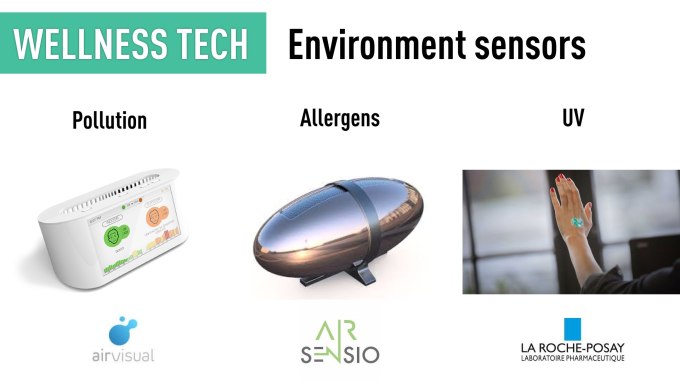
HAX startup Darma measures various biosignals (ECG, breathing, etc.) via a non-contact sensor in a smart cushion (because sitting is the new smoking) or hospital beds. Others are looking into measuring UV: startups but also heavyweights like Microsoft with its Band 2 and La Roche-Posay with its disposable UV patch. Light therapy is also gaining ground as we understand better the disruptive effects of artificial light on focus and sleep.
Mobile/Home Hospital: Low-cost, portable and connected versions of medical devices are enabling the emergence of mobile or home diagnostic and care. For instance, iBreastExam helps perform painless and radiation free breast scans, providing results instantly at the point of care. It was created in India where there is only one radiologist per 100,000 inhabitants. Depending on costs and regulations, some of those solutions might apply to both emerging and developed markets.
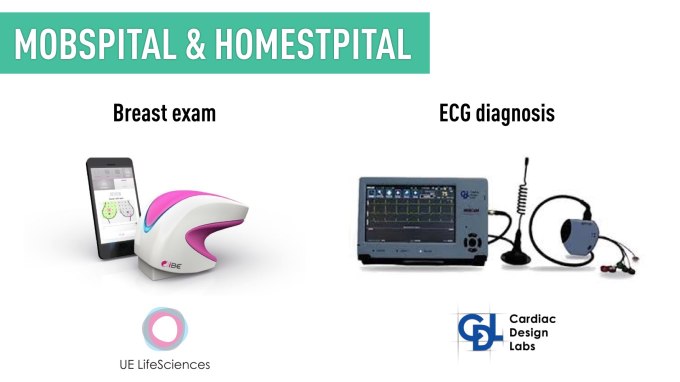
Interestingly, this emerging category has some parallels with the world of desktop manufacturing: taking large and expensive machines from factories and making them smaller and cheaper.
Wearapeuthics: Wearables that heal you. What about a mask by Neutrogena to treat acne using light therapy or HAX alum Sana, which helps chronic pain and PTSD sufferers fall asleep in minutes. Some of our portfolio companies are using biofeedback and neuroplasticity to manage various conditions: Lief Therapeuthics deals with anxiety (which just raised over $400k on Kickstarter), Liv with unconscious behaviors like nail biting or hair pulling, and Feel with emotional awareness to help manage depression, using biofeedback and neuroplasticity.
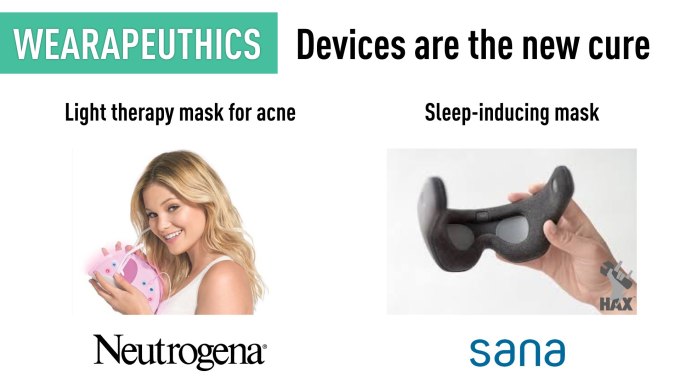
Baby Tech: Gerber introduced BabyNes, a “mom and baby integrated solution system” targeting the fast-growing tech mom segment. They opened their first flagship store in Hong Kong this year. HAX company BabyBe created a “soft robotics” smart mat to help the development of premature babies.
Metabolic Tech & Ingestibles: What is going on inside our bodies? Despite the Theranos debacle, over a dozen startups are looking at our blood – to track diabetes, detect various blood markers, analyze blood type or diseases. HAX startup Aire created the first pocket breathalyzer to able to help IBS sufferers by testing for food intolerances.
And if just taking a look inside is not enough, the ‘ingestible’ sensor by Proteus Health combines with a smart patch and mobile app to track a patient’s condition. Next up: hydration tracking.
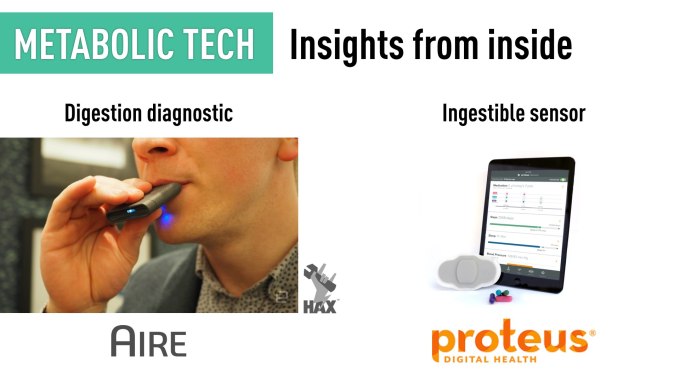
Neuro Tech: Brainwave-sensing went from basic tracking to help with meditation, sleep and work – bringing us states of flow in the midst of the most distracting world that ever was. HAX alumni Berkeley Ultrasound even stimulates your brain using ultrasound to treat depression. Will such device compete with anti-depressants drugs? It apparently also has potential as a cure for Alzheimer’s.
Bionics: Did you know that no less than three companies developing exoskeletons went public in 2014? Two in the US – Ekso Bionics and ReWalk Robotics – and one in Japan, named Cyberdyne (yes, like that Cyberdyne) where is enjoys a two billion dollars market cap. More are coming, like SuitX, or the recent HAX graduate Japet, who makes a bionic rehab solution for back pain.
Implantables: The dream of every bio-hacker has come true: we finally have implants beyond basic RFID chips. Profusa, for instance, is a tiny biocompatible implant that sits under your skin and uses fluorescence to indicate levels of oxygen, glucose, lactate, or other biomarkers.
Health tech devices are only getting started. Let us know if you noticed other emerging categories!
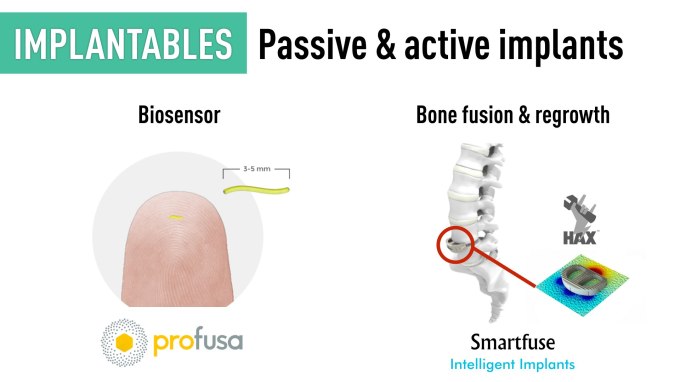
Redefining Health & Wellness
We’re just scratching the surface of what sensors, big data, machine learning and AI can do for us. In our disease-free future, being simply tired, or unfocused, might be seen as a major health issue. On our way to better health, it is already time to rethink what it means to be well.
Note from the authors: are you building a health tech device? Apply to HAX and its Health Track!































Comment